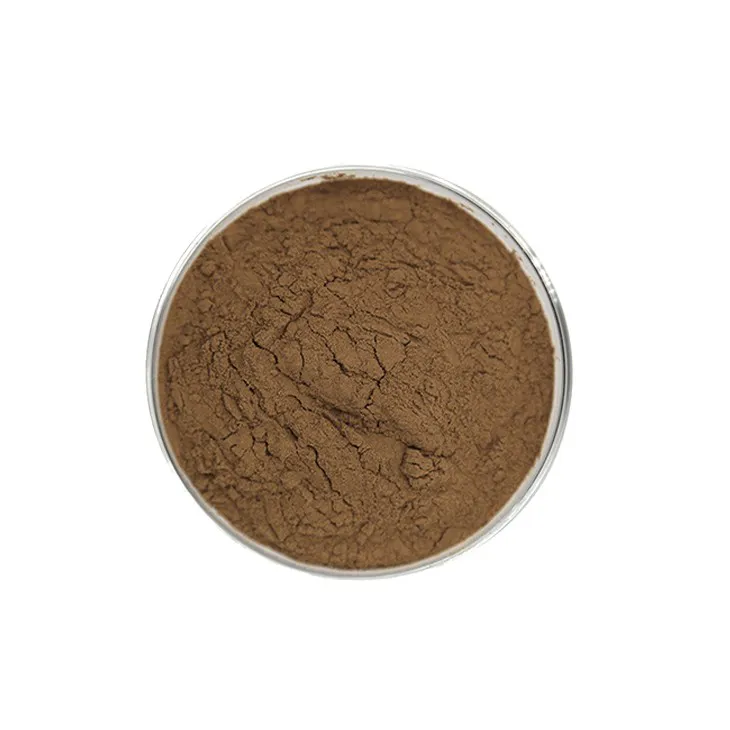- 0086-571-85302990
- sales@greenskybio.com
Does dandelion root extract have benefits for diabetes? Are these all safe and applicable for diabetic patients?
2024-11-12

1. Introduction
Diabetes is a global health concern, affecting millions of people worldwide. Management of diabetes often involves lifestyle modifications, medications, and sometimes, complementary and alternative therapies. Dandelion Root Extract has emerged as a potential candidate in the realm of natural remedies for diabetes. This article aims to explore whether Dandelion Root Extract has benefits for diabetes and if it is safe and applicable for diabetic patients.

2. Dandelion Root Extract: Composition and Properties
Dandelion root extract is rich in various bioactive compounds. It contains polyphenols, which are known for their antioxidant properties. These antioxidants play a crucial role in reducing oxidative stress in the body. Oxidative stress is often elevated in diabetic patients and is associated with the development of complications such as neuropathy, retinopathy, and nephropathy.
It also contains flavonoids, which have been shown to have anti - inflammatory effects. Inflammation is another factor that is commonly increased in diabetes. Chronic inflammation can disrupt normal insulin signaling and contribute to insulin resistance, a key feature of type 2 diabetes.
Furthermore, dandelion root extract contains certain terpenoids that may have potential effects on various physiological processes related to diabetes.

3. Potential Benefits for Diabetes
3.1. Impact on Insulin Sensitivity
One of the main areas of interest regarding dandelion root extract in diabetes is its potential effect on insulin sensitivity. Insulin sensitivity refers to how responsive the body's cells are to insulin. In type 2 diabetes, cells become resistant to insulin, leading to elevated blood sugar levels.
Some studies suggest that the bioactive compounds in dandelion root extract may help improve insulin sensitivity. Polyphenols and flavonoids in the extract may interact with cellular signaling pathways involved in insulin action. For example, they may enhance the activity of insulin receptors on the cell surface, allowing for more efficient uptake of glucose by cells. This, in turn, can lead to better blood sugar control.
However, it is important to note that the evidence in this regard is still in the early stages, and more research is needed to fully understand the mechanisms and the magnitude of the effect on insulin sensitivity.
3.2. Blood Sugar Regulation
Dandelion root extract may also play a role in directly regulating blood sugar levels. Some animal studies have shown that dandelion root extract can lower blood glucose levels. This could be due to its ability to stimulate the secretion of insulin from pancreatic beta - cells or by inhibiting the breakdown of carbohydrates in the digestive tract, thereby reducing the amount of glucose that enters the bloodstream.
Nevertheless, human studies are relatively scarce, and the translation of these findings from animal models to humans remains uncertain. Diabetic patients should not rely solely on dandelion root extract for blood sugar control but rather consider it as a potential adjunct to conventional diabetes management.
3.3. Antioxidant and Anti - inflammatory Effects
As mentioned earlier, the antioxidant and anti - inflammatory properties of dandelion root extract are potentially beneficial for diabetic patients. By reducing oxidative stress, the extract may help prevent or slow down the development of diabetes - related complications. For instance, in diabetic retinopathy, oxidative stress can damage the blood vessels in the retina, leading to vision problems. The antioxidants in dandelion root extract may scavenge free radicals and protect the retinal vessels.
Similarly, the anti - inflammatory effects can help reduce chronic inflammation in the body, which is often associated with insulin resistance. By alleviating inflammation, the extract may contribute to better glycemic control and overall health in diabetic patients.

4. Safety Profile
4.1. General Safety
Dandelion root extract is generally considered safe when consumed in moderation. It has been used in traditional medicine for centuries without significant reports of major adverse effects.
However, some people may experience mild side effects such as gastrointestinal discomfort, including nausea, diarrhea, or abdominal cramps. These side effects are usually transient and may be related to the individual's sensitivity to the extract or the dosage consumed.
4.2. Drug Interactions
One important aspect to consider when using dandelion root extract for diabetic patients is the potential for drug interactions. Diabetic patients often take medications such as metformin, sulfonylureas, or insulin to control their blood sugar levels.
Dandelion root extract may interact with these medications. For example, it may enhance the hypoglycemic effects of medications, leading to an increased risk of hypoglycemia (low blood sugar). This can be particularly dangerous for diabetic patients, as severe hypoglycemia can cause seizures, loss of consciousness, and other serious complications.
Therefore, it is crucial for diabetic patients to consult their healthcare provider before starting dandelion root extract, especially if they are taking diabetes medications.
4.3. Special Patient Populations
There are also certain patient populations within the diabetic group that may require extra caution when considering dandelion root extract.
- Pregnant and breastfeeding women: Limited research exists on the safety of dandelion root extract during pregnancy and breastfeeding. It is not known whether the bioactive compounds in the extract can cross the placenta or be excreted in breast milk and what potential effects they may have on the fetus or the nursing infant.
- Patients with kidney or liver disease: Dandelion root extract is metabolized in the liver and excreted by the kidneys. In patients with impaired liver or kidney function, the metabolism and excretion of the extract may be affected, leading to potential accumulation of its components in the body. This could increase the risk of adverse effects.
5. Conclusion
In conclusion, dandelion root extract shows some potential benefits for diabetes, particularly in terms of its effects on insulin sensitivity, blood sugar regulation, and antioxidant and anti - inflammatory properties. However, the evidence is still not conclusive, and more research, especially large - scale human trials, are needed.
Regarding safety, while it is generally considered safe in healthy individuals, diabetic patients need to be cautious due to the potential for side effects and drug interactions. Pregnant and breastfeeding women, as well as those with kidney or liver disease, should exercise even greater caution or avoid using dandelion root extract altogether.
Overall, dandelion root extract should not be used as a substitute for conventional diabetes treatment but may be considered as a complementary approach under the guidance of a healthcare provider.
FAQ:
Question 1: How does dandelion root extract potentially affect insulin sensitivity?
Some studies suggest that dandelion root extract may contain compounds that could enhance insulin sensitivity. It might work by influencing the signaling pathways related to insulin in cells. For example, certain bioactive components in the extract could interact with the insulin receptors on cells, making them more responsive to insulin. However, more research is needed to fully understand the exact mechanisms at play.
Question 2: Are there any clinical trials showing the benefits of dandelion root extract for diabetes?
There have been some small - scale clinical trials and pre - clinical studies. These studies have shown some promising results, such as a potential reduction in blood glucose levels in diabetic animal models. But large - scale, well - designed clinical trials in humans are still relatively scarce. So, while the initial findings are interesting, we can't yet draw definitive conclusions about its effectiveness in human diabetes treatment based solely on these limited studies.
Question 3: Can dandelion root extract cause any side effects in diabetic patients?
Dandelion root extract may cause some side effects in certain individuals. Some people might experience allergic reactions, which could manifest as skin rashes, itching, or swelling. Additionally, it could potentially interact with other medications that diabetic patients are taking. For example, if a diabetic patient is on blood - thinning medications, dandelion root extract might increase the risk of bleeding due to its possible anticoagulant properties. So, it's crucial for diabetic patients to consult their healthcare providers before using it.
Question 4: How should diabetic patients use dandelion root extract if it is deemed safe?
If a healthcare provider determines that dandelion root extract is safe for a diabetic patient to use, the dosage and form of use are important considerations. It could be available in various forms such as capsules, tinctures, or teas. The appropriate dosage would depend on factors like the patient's overall health, the severity of their diabetes, and other medications they are taking. In general, it's advisable to start with a low dose and gradually increase it while closely monitoring for any adverse effects, such as changes in blood glucose levels or the appearance of new symptoms.
Question 5: Does dandelion root extract have any long - term benefits for diabetes management?
At present, there is not enough evidence to confirm long - term benefits. While short - term studies have hinted at possible benefits like blood glucose control, we don't know if these effects would persist over a long period. Long - term use also raises concerns about potential cumulative side effects and interactions. Diabetic patients are usually managing a complex set of health factors, and the long - term impact of adding dandelion root extract to their regimen needs further investigation.
Related literature
- Dandelion Root Extract: Potential Benefits and Risks in Diabetes Management"
- "The Role of Herbal Extracts, Including Dandelion Root, in Diabetes: A Review"
- "Dandelion Root and Insulin Sensitivity: Current Research Findings"
- ▶ Hesperidin
- ▶ citrus bioflavonoids
- ▶ plant extract
- ▶ lycopene
- ▶ Diosmin
- ▶ Grape seed extract
- ▶ Sea buckthorn Juice Powder
- ▶ Beetroot powder
- ▶ Hops Extract
- ▶ Artichoke Extract
- ▶ Reishi mushroom extract
- ▶ Astaxanthin
- ▶ Green Tea Extract
- ▶ Curcumin Extract
- ▶ Horse Chestnut Extract
- ▶ Other Problems
- ▶ Boswellia Serrata Extract
- ▶ Resveratrol Extract
- ▶ Marigold Extract
- ▶ Grape Leaf Extract
- ▶ blog3
- ▶ blog4
- ▶ blog5
-
Organic Tongkat Ali extract powder factory.
2024-11-12
-
How to make powder with ashwagandha extract.
2024-11-12
-
Rosehip extract manufacturers from China.
2024-11-12
-
The best cat's claw extract in nature.
2024-11-12
-
Chinese Dandelion Leaf Extract Suppliers.
2024-11-12
-
Hedyotis Diffusa Extract
2024-11-12
-
Lavender Extract
2024-11-12
-
Red Wine Extract
2024-11-12
-
Hawthorn powder
2024-11-12
-
Quercetin
2024-11-12
-
Peppermint Oil
2024-11-12
-
Sophora Japonica Flower Extract
2024-11-12
-
Mulberry Extract
2024-11-12
-
Chasteberry Extract
2024-11-12
-
Plantain extract
2024-11-12





















